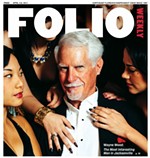Bash Pop: Dancehall's Anti-Gay Bias
On Wednesday, Oct. 19, dancehall artist Buju Banton stood trial for barging into a house in Kingston, Jamaica, with an armed gang, and beating six gay men while chanting anti-gay slogans. A month from now, he's scheduled to perform his homophobic anthems at Plush in Jacksonville, Fla.
Some fans of dancehall are aware of its reputation for gay-bashing. But the hateful messages (the UK-based gay-rights group Outrage! calls it "murder music") are lost on many who find themselves jamming benignly to dancehall’s infectious beat.
Ignorance of the genre’s homophobic themes stems largely from language barriers. Banton’s "Boom Boom Bye Bye" recommends shooting "batty boys" (the Jamaican-slang equivalent of "faggots"), but the average clubgoer wouldn’t pick up on it:
The world is in trouble/Anytime Buju Banton come/Batty boy get up and run ah gunshot in ah head man/Tell dem crew it’s like/Boom bye bye, in a batty boy head, rude boy nah promote no nasty man, them hafi dead.
When sung in dancehall’s gruff vocal style, a message meant to evoke, if not provoke, violence is often lost in the heavy synth lines and droning beats.
Banton isn’t just a threatening underground artist. He’s one of the most popular musicians in Jamaica’s history. And while he may be dancehall’s most notorious gay-basher, he’s far from the only one. Capleton, Yellow Man, Beenie Man and Elephant Man encourage fans to shoot, maim, burn, stone, drown and (ironically) rape gay men. All either recently performed at Plush or have concerts scheduled.
Dancehall artists’ acerbic homophobia is a product of Jamaica’s overwhelmingly anti-gay culture, where Old-Testament fundamentalism and Rastafarianism run deep. (Jamaica boasts more churches per square mile than any other nation.) The island’s law expressly forbids homosexual acts — Articles 76 and 79 of the Jamaican Offenses Against the Person Act call for the imprisonment of men who practice sodomy or even casually display affection in public. Police are often complicit and at times directly involved in anti-gay violence, even against those who are seeking help from officers. Gay men are regularly harassed, and sometimes tortured and murdered, by groups of attackers, according to the Jamaican Forum for Lesbians, All-Sexuals and Gays.
Of course, societal values vary, but these artists are taking their message to more tolerant societies — and activist groups are taking the musicians to task. Last year, Beenie Man — whose lyrics include "queers must be killed" — found his U.S. tour in shambles when multiple venues cancelled his shows. MTV nixed his performance at the Video Music Awards Block Party in Miami. Even the conscientious folks at cigarette manufacturer RJ Reynolds knew when to prioritize values over profits, calling off the 14 Beenie Man shows they sponsored.
But in Northeast Florida, anti-gay dancehall artists tend to pass under the radar. Tom Fisher, concert promoter for Plush, says he had no idea that some of the artists who perform at the venue have a controversial rep. "This is the first I’ve heard of it," he says, adding that he’s never received a complaint about hosting their shows. He says an Orlando promoter pitches the dancehall shows to Fisher, and from that point his decision to book an act hinges on whether he thinks the show will make money. If a concert were pitched to him as anti-gay, Fisher says he’d "probably think twice about booking it." Fisher points out that Plush has hosted several events that have attracted the local gay community, such as an AIDS Awareness benefit this year.
Brian Winfield, communications director of Equality Florida, an anti-discrimination group, concedes that concert promoters walk a tightrope. "These venues are commercial enterprises," he says. "Promoters have to consider their profit margin. But I do think they have a certain public responsibility, and we would encourage them to reconsider bringing in acts who are rabidly homophobic." As for dancehall’s ugly message, Winfield puts the artists’ freedom of expression in perspective. "While we believe in their right to free speech," he says, "we also have a right to not listen."






